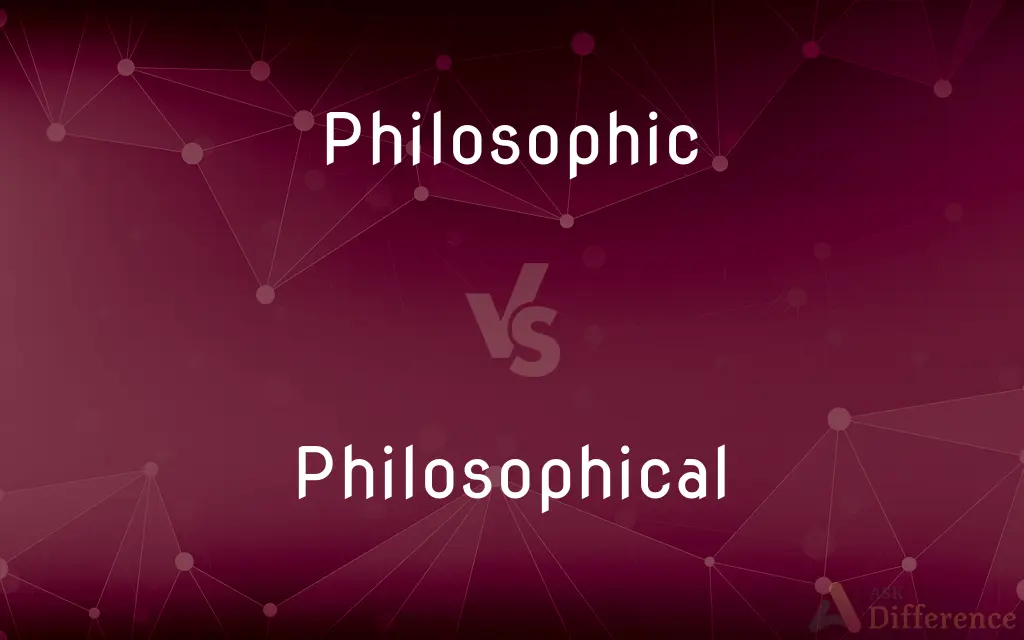Philosophic vs. Philosophical — What's the Difference?
By Tayyaba Rehman & Fiza Rafique — Updated on April 4, 2024
Philosophic focuses on the nature of philosophy and theoretical understanding, whereas philosophical denotes a broader application, including attitudes and approaches to life.

Difference Between Philosophic and Philosophical
Table of Contents
ADVERTISEMENT
Key Differences
Philosophic pertains specifically to the study or making of theories about knowledge, reality, and existence, highlighting the theoretical aspects of philosophy. On the other hand, philosophical is often used to describe a person's calm and rational approach to life's challenges, embodying the practical application of philosophic principles.
Philosophic discussions are usually academic and centered around philosophical theories and ideas, aiming to deepen understanding within the field. Whereas philosophical can also refer to a way of thinking that applies philosophical concepts to everyday life, making it more accessible to a general audience.
The term philosophic often appears in contexts discussing the history, methodology, and categorization within the discipline of philosophy. Philosophical, however, is more likely to be found in general discourse, reflecting on personal beliefs, ethics, or attitudes influenced by philosophical thinking.
Philosophic writings are characterized by their focus on argumentative structure, logical consistency, and theoretical exploration. Philosophical writings, on the other hand, may also include reflections, personal narratives, or essays that explore the implications of philosophical ideas on life and human experience.
In academia, the distinction between philosophic and philosophical can signify the difference between a strictly theoretical investigation and a more interdisciplinary or applied philosophical inquiry. Philosophical studies often intersect with other disciplines, such as psychology, sociology, and even natural sciences, indicating its broad applicability.
ADVERTISEMENT
Comparison Chart
Focus
Theoretical understanding of knowledge, reality, existence
Application of philosophy to life's challenges and attitudes
Usage
Academic and theoretical discussions
Broad, including everyday thinking and ethics
Context
Academic writings, theoretical exploration
General discourse, personal beliefs, interdisciplinary studies
Nature
Primarily argumentative and logical
Reflective, narrative, exploring practical implications
Aim
Deepen understanding within philosophy
Apply philosophical concepts to improve personal and social life
Compare with Definitions
Philosophic
Focused on the abstract and theoretical aspects of philosophy.
The lecture covered the philosophic foundations of ethics.
Philosophical
Interdisciplinary, applying philosophical concepts across various fields.
The course explores the philosophical implications of artificial intelligence.
Philosophic
Concerned with philosophical theory rather than practical application.
Her interests are strictly philosophic, concentrating on metaphysics.
Philosophical
Broad in scope, including ethics, logic, and epistemology.
His writings are deeply philosophical, questioning the essence of happiness.
Philosophic
Academic in nature, pertaining to scholarly philosophical inquiry.
The journal publishes articles that contribute to philosophic discourse.
Philosophical
Pertaining to or reflective of the principles of philosophy in general life.
His philosophical outlook helped him cope with the loss.
Philosophic
Reflecting a theoretical approach to understanding philosophical issues.
The seminar encouraged a philosophic examination of reality.
Philosophical
Encompassing a calm and rational approach to life's challenges.
She adopted a philosophical attitude towards her setbacks.
Philosophic
Relating to the study or theory of philosophy.
His thesis presented a complex philosophic argument on the nature of consciousness.
Philosophical
Engaged in the practical application of philosophical theories.
The movement seeks to apply philosophical ideas to social reform.
Philosophic
Of, relating to, or based on a system of philosophy.
Philosophical
Of, relating to, or based on a system of philosophy.
Philosophic
Characteristic of a philosopher, as in equanimity, enlightenment, and wisdom.
Philosophical
Characteristic of a philosopher, as in equanimity, enlightenment, and wisdom.
Philosophic
Synonym of philosophical
Philosophical
Of, or pertaining to, philosophy.
Philosophic
Of or pertaining to philosophy; versed in, or imbued with, the principles of philosophy; hence, characterizing a philosopher; rational; wise; temperate; calm; cool.
Philosophical
Rational; analytic or critically-minded; thoughtful.
Philosophic
Of or relating to philosophy or philosophers;
Philosophical writing
A considerable knowledge of philosophical terminology
Philosophical
Detached, calm, stoic.
Philosophic
Characteristic of or imbued with the attitude of a philosopher or based on philosophy;
That breadth of outlook that distinguishes the philosophic mind
Their differences were philosophical
Philosophical
Of or relating to philosophy or philosophers;
Philosophical writing
A considerable knowledge of philosophical terminology
Philosophic
Characterized by the attitude of a philosopher; meeting trouble with level-headed detachment;
Philosophical resignation
A philosophic attitude toward life
Philosophical
Characterized by the attitude of a philosopher; meeting trouble with level-headed detachment;
Philosophical resignation
A philosophic attitude toward life
Philosophical
Characteristic of or imbued with the attitude of a philosopher or based on philosophy;
That breadth of outlook that distinguishes the philosophic mind
Their differences were philosophical
Common Curiosities
What is the main difference between philosophic and philosophical?
Philosophic focuses on the theoretical aspects of philosophy, whereas philosophical encompasses a broader application, including attitudes towards life.
Do philosophic discussions have practical applications?
While philosophic discussions are more theoretical, they can lay the groundwork for practical applications found in philosophical discourse.
Can a person be described as philosophic?
Typically, "philosophic" refers more to the theoretical aspect of philosophy rather than describing a person's nature.
Is philosophical thinking applicable in everyday life?
Yes, philosophical thinking can be applied to everyday life, offering a rational and calm approach to dealing with various situations.
How are philosophic and philosophical approaches taught in academia?
They are taught through a combination of theoretical study, critical thinking exercises, and reflection on practical implications.
Can philosophical discussions be informal?
Yes, philosophical discussions can be informal, exploring philosophical ideas in everyday conversations.
Are philosophic writings accessible to the general public?
Philosophic writings are generally more academic and might be less accessible than philosophical writings, which often address broader audiences.
How does philosophical inquiry differ from philosophic inquiry?
Philosophical inquiry often includes practical implications and interdisciplinary approaches, while philosophic inquiry is more focused on theoretical understanding.
Can a work be both philosophic and philosophical?
Yes, many works integrate theoretical exploration with practical applications, embodying both attributes.
Why is it important to differentiate between philosophic and philosophical?
Understanding the difference helps clarify whether the focus is on theoretical principles or the application of those principles in broader contexts.
Is it important for a philosophical person to understand philosophic theories?
While it can enhance understanding, one can adopt a philosophical approach to life without deep knowledge of philosophic theories.
Can philosophical principles affect personal life?
Yes, adopting philosophical principles can significantly affect one's approach to personal life and challenges.
Are all philosophers concerned with both philosophic and philosophical aspects?
Most philosophers engage with both aspects, though their focus may vary based on their interests and specializations.
How do philosophic and philosophical writings contribute to society?
Both contribute by deepening understanding of existential questions and by applying this understanding to improve social and individual well-being.
Do you need to study philosophy to have a philosophical outlook?
Not necessarily. A philosophical outlook can be developed through personal reflection and consideration of life's big questions.
Share Your Discovery

Previous Comparison
Excise vs. Remove
Next Comparison
Zinc vs. AlkalineAuthor Spotlight
Written by
Tayyaba RehmanTayyaba Rehman is a distinguished writer, currently serving as a primary contributor to askdifference.com. As a researcher in semantics and etymology, Tayyaba's passion for the complexity of languages and their distinctions has found a perfect home on the platform. Tayyaba delves into the intricacies of language, distinguishing between commonly confused words and phrases, thereby providing clarity for readers worldwide.
Co-written by
Fiza RafiqueFiza Rafique is a skilled content writer at AskDifference.com, where she meticulously refines and enhances written pieces. Drawing from her vast editorial expertise, Fiza ensures clarity, accuracy, and precision in every article. Passionate about language, she continually seeks to elevate the quality of content for readers worldwide.















































